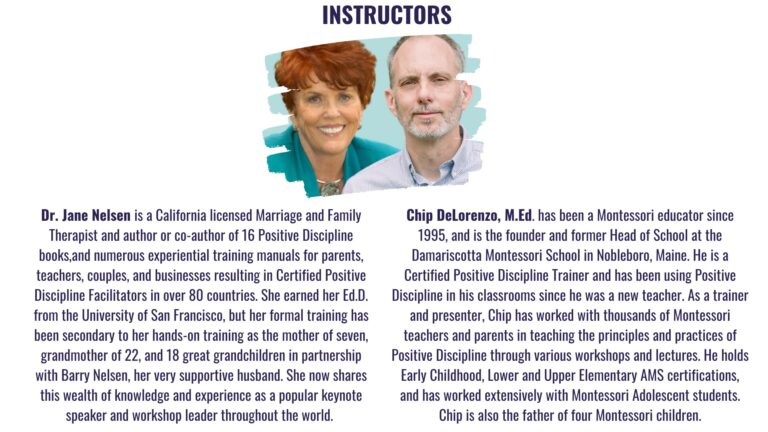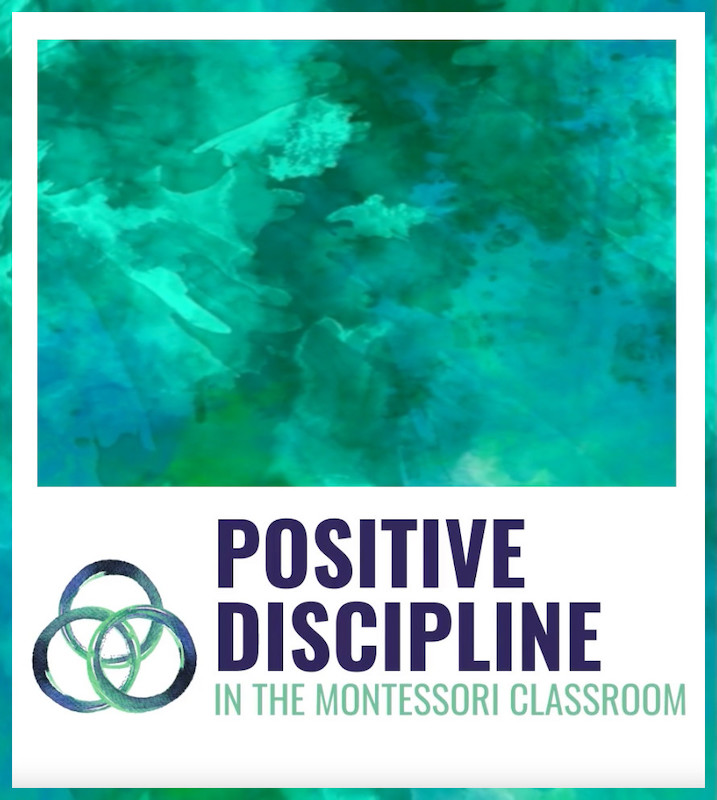Course Description
The Positive Discipline in the Montessori Classroom virtual course provides a method of child guidance based on the behavioral psychology principles of Alfred Adler and Rudolf Driekurs. The course provides you with a framework for child guidance and a set of classroom management tools congruent with Montessori philosophy that is not often covered in Montessori teacher training programs. The tools provided cultivate classrooms where students independently resolve conflicts with each other, are better able to regulate their emotions, they take responsibility for their actions, and everyone contributes to maintaining a harmonious learning environment.
The course instructors are Dr. Jane Nelsen, co-founder of Positive Discipline and a licensed Marriage and Family Therapist, and Chip DeLorenzo, an experienced Montessori educator with 30-years of experience in various positions from lead guide to head of school and Positive Discipline facilitator. This extraordinary team have a warm and clear delivery of practical solutions that expand your ability to respectfully guide children in ways that assist them in feeling a sense of belonging and significance, which in turn positively impacts their behavior and learning outcomes. Chip is a master storyteller, and his experiences in the Montessori classroom provide the backdrop for understanding and applying the Positive Discipline techniques effectively.
Delivered through memorable stories and actionable strategies, the 10 Lessons walk you through the underlying principles of Positive Discipline in the Montessori Classroom. Along with the companion Playbook and bonus book, this course will make a positive impact in your relationship with every student and build greater social cohesion in your classroom and school community.
Course Materials
Here are the items you will need to take the workshop:
- A Device (computer, tablet or smart phone) with up-to-date browser software
- An Internet connection that can support watching videos (for example YouTube)
- Speakers or headphones
- The ability to download & print a .pdf Playbook
(A link is available in your purchase confirmation email or in the first lesson)
Course Contents
Chapter 1 – Introduction
- 1.1 Introduction
- 1.2 Principles of Effective Discipline
- 1.3 Two Lists
- 1.4 Curiosity Questions
- 1.5 Kind and Firm Chart
Chapter 2 – Why do they do that?
- 2.1 – Mistaken Goal Chart
- 2.2 – Mistakes, Really?
- 2.3 – Thinking, Feeling and Deciding
- 2.4 – Top Card
Chapter 3 – Getting on the Same Page
- 3.1 – Transition Planning
- 3.2 – Do They Know You Care
- 3.3 – When Teachers Disagree
Chapter 4 – Tools for Cooperation and Follow Through
- 4.1 – Encouragement vs. Praise
- 4.2 – The Power of Silence: Maintaining Limits
- 4.3 – Respectful Responses to Disrespectful Behavior
- 4.4 – I Need a Hug or I Need Some Help
- 4.5 – Tools or Tricks
Chapter 5 – Beware of Logical Consequences
- 5.1 – Logical Consequences
- 5.2 – Problem Solving
- 5.3 – Deciding What You Will Do
- 5.4 – Limited Choices
- 5.5 – Natural Consequences
Chapter 6 – Self-Regulation and the Brain
- 6.1 – Brain in the Palm of Your Hand
- 6.2 – Positive Time-Out
- 6.3 – The Wheel of Choice
Chapter 7 – Communicating for Cooperation and Understanding
- 7.1 – Competent Giant
- 7.2 – 3 R’s of Recovery
- 7.3 – Curiosity Questions – Conversational
- 7.4 – Reflective Listening
Chapter 8 – Making Peace
- 8.1 – “I” Messages
- 8.2 – Why Conflict Resolution Fails and What To Do
- 8.3 – Conflict Resolution Process
Chapter 9 – Putting It All Together – The Class Meeting
- 9.1 – Introduction to Class Meetings
- 9.2 – Class Meeting 6+
- 9.3 – Class Meeting 3-6
Chapter 10 – Continuum of Change
- 10.1 – Belonging and Significance
- 10.2 – Brain in the Heart
- 10.3 – Conclusion




